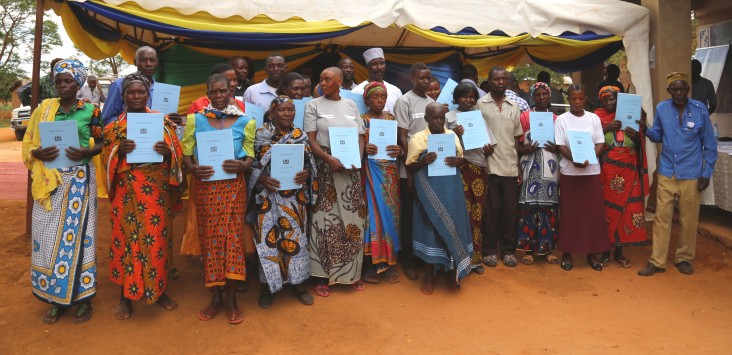 Villagers in Kinywang’anga celebrate the completion of land registration efforts in their community.
USAID
Villagers in Kinywang’anga celebrate the completion of land registration efforts in their community.
USAID
 Villagers in Kinywang’anga celebrate the completion of land registration efforts in their community.
USAID
Villagers in Kinywang’anga celebrate the completion of land registration efforts in their community.
USAID
Speeches Shim
It is mid-morning in Kiponzelo village and already the sun weighs heavily on the Tanzanian landscape. As noon approaches, 23-year-old Gaspar Bangi picks his way through the scrub, trailing one of several surveying teams at work in the community.
Guided by a local farmer, Bangi skirts the boundary between two fields, pausing every so often to register a coordinate on his Android tablet. After 15 minutes, his progress is displayed on screen: Overlaid on a satellite image, the farmer’s plot is neatly outlined from above—the first step in submitting an official land claim.
Like most rural communities in Tanzania, Kiponzelo has a traditional system of land ownership, where property lines are a matter of conjecture, and land is often transferred through undocumented negotiations. That’s changing, however, thanks to teams like Bangi’s.
He is known as a para-surveyor—a local recruit able to accurately map land using informal training and non-traditional tools. Think mobile apps and smart devices rather than measuring tape and tripods. Together with a pair of adjudicators who mediate conflicts when competing claims arise, Bangi is out to register every last land claim in Kiponzelo.
It’s only their first plot of the day, and in a village with hundreds of claims, Kiponzelo’s surveying teams have a long road ahead.
Meanwhile, in Kinywang’anga, another village just down the road, workers haul boxes filled with hundreds of bright blue certificates for distribution. Known as certificates of customary rights of occupancy (the Tanzanian equivalent of a deed), each one issued to a villager will provide legal recognition of their right to a piece of land.
As the first community to partner with the Feed the Future Tanzania Land Tenure Assistance activity, residents of Kinywang’anga are among the first rural citizens to receive such documentation. This provides a number of benefits: indisputable proof of one’s claim, the peace of mind to invest in the land, and a documented means to sell, inherit or transfer land.
“We used to have a lot of conflict between farmers,” said village chairman Adam Garime. “They simply didn’t know where one person’s land ended and another’s began.”
In many ways, the land registration process is designed to ease such conflicts. “In the beginning, we worked to create awareness on the importance of owning land and having a title,” said Garime. “In the process, village members were not only able to get a title for their land, but were trained how to resolve disputes.”
This USAID-funded project is an effort to reduce risks related to land tenure and improve agricultural investment. It is expected to benefit over 14,000 villagers in 41 villages, registering an estimated 50,000 plots by the end of 2019.
Land tenure remains an area of focus under Feed the Future, the U.S. Government’s global hunger and food security initiative, as a means of promoting economic growth, strengthening agriculture and safeguarding natural resources. In line with the U.S. Government’s national security interests, land tenure improves Tanzania’s economic outlook, prevents land disputes and displacements, and provides gainful employment for youth, helping Tanzania persevere as a mainstay of stability and security in East Africa. By formalizing land ownership, Tanzania stands to jump-start household agricultural investment by giving landowners the security needed to invest in their land. A documented land claim increases property values, is attractive to buyers and encourages better stewardship of the land. Whereas marginalized community members may not be eligible for land ownership under a traditional system, all citizens have this right under Tanzanian law.
Local surveying teams are often the first step in mediating village land disputes. “The first conflict we resolved involved a man with three wives,” recalled Tumepewa Fabian, a para-surveyor in Kinywang’anga. “The man and his first wife laid claim over all the land, while the other wives had none. Eventually, we convinced the husband to share ownership, and once we surveyed his land, we were able to divide it between the three.”
Women and Youth Stake Their Claim
One of the first steps taken in Kinywang’anga was to inform villagers that all citizens are entitled to a claim that they can survey and corroborate among their neighbors, regardless of gender or socioeconomic status. This contrasts with traditional land tenure, which is commonly based around gender, familial alliance and status, with ownership defaulting to men.
“I now understand women’s land rights are fundamental human rights,” said landholder Anita Mfilinge after being trained on the extent of the law. Inspired, Mfilinge and her husband pursued joint ownership, giving each an equal stake in their property.
If Kinywang’anga is any indicator, women are set to play a central role in village land registration. Of the 350 villagers to document claims, more than half were women—with two-thirds of total certificates issued listing women as having either joint or exclusive rights to a parcel.
In Kiponzelo, Scholastica Bangi (no immediate relation to Gaspar) is eager to follow their example. “My family has lived in this area for four generations,” she said. “My siblings and I all have land, but this is the first time we will be able to register it.”
As someone who splits her time between Tanzania and Rwanda, this gives Scholastica Bangi peace of mind when she is abroad. More importantly, formal ownership will ensure she can pass land down to her children.
“Inheritance laws alone don’t provide protection,” she explained. “This gives me another option. This document will let me decide who gets what.”
Women and youth are also entitled to participate as members of land registration teams. In particular, local para-surveyors are drawn from the young men and women of the community due to their familiarity with mobile technology. With the indispensable role they play in these efforts, it is little surprise these youth are also documenting claims of their own.
At just 20, Tumepewa Fabian is among that group. “I have 2 acres from my parents, and another quarter acre that I bought,” he said. “I’m growing maize and sunflowers, and I hope to build a house here. Without this program, my parents would never have divided their land up like this.”
All Eyes on Kiponzelo
Back in Kiponzelo, Gaspar Bangi winds down after a long day mapping his neighbors’ claims.
Male or female, powerful or poor, each villager is one step closer to having their property protected by law. Now that Kinywang’anga has proven communities can independently document village lands at low cost, all eyes are on Kiponzelo to answer whether this system can be replicated to the surrounding region and beyond.
It’s a lot of pressure—but it’s at the back of Bangi’s mind. Focused on his tablet, he presses on, determined to finish every last claim. He may not realize, but step by step, coordinate by coordinate, he is mapping out the future of his village—and quite possibly, his country.







Comment
Make a general inquiry or suggest an improvement.